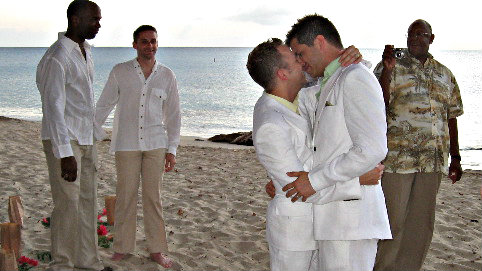
The couple legally married in California in 2008 and this year they can file their federal taxes as a couple for the first time because of the Supreme Court's ruling on the Defense of Marriage Act last year.
The ruling led to a new IRS rule that allows joint tax filings for legally married same-sex couples.
Thiele says that filing a joint return will save a lot of money, but the couple might not qualify to receive those benefits at the state level because same-sex marriage is illegal in Colorado.
"Right now, those of us who are legally married, same-sex couples living here are being penalized in a way straight couples are not," Thiele says.
In fact, state law isn't entirely clear on this point.
The Supreme Court ruling did not comment on the 33 state bans on same-sex marriage and Justices did not provide guidance on reconciling differences between Federal and state laws.
State Senator Pat Steadman (D-Denver) is proposing a new law to address those differences and, if passed, the measure would allow any couple that legally files a joint federal return to file state taxes the same way.
In other words, same-sex couples who were legally married in other states would be able to file taxes jointly in Colorado.
The measure was approved by the Colorado Senate and moves on to the House.
Steadman says the measure follows existing Colorado law requiring Coloradans to file state and federal taxes under the same status.
But opponents of the bill say it violates the state constitution which defines marriage as existing between a man and a woman.
"It’s recognizing same-sex married couples from other states in direct opposition to what the constitution says marriage is in this state," State Senator Kevin Lundberg (R-Berthoud) says.
Lundberg and other critics of the legislation are also concerned about the financial impact the bill could have on the state.
Lundberg is advocating for the state to issue instructions to help same-sex couples convert their joint federal tax filings to separate state filings, following the example set by Wisconsin.
Steadman counters that a Wisconsin-style fix would unfairly burden married same-sex couples who would have to spend additional time, and possibly money, to prepare a second tax filing.
The couples would also have a higher state tax burden than they would if they filed a joint return.
Other states are addressing the problem created by the new IRS rule in other ways.
Idaho, like Wisconsin, will require same-sex couples to file as unmarried.
Missouri and Utah , however, are among the states allowing joint filings for married same-sex couples.
Underlying these new questions about tax status is Colorado's constitutional amendment that defines marriage as existing between a man and a woman.
While there is still significant support for maintaining the statewide ban on same-sex marriage, the national tide seems to be turning the other way.
Polls show a majority of Americans now support same-sex marriage and legislatures in Rhode Island, Delaware, Minnesota, Hawaii and Illinois legalized same-sex marriage in 2013, bringing the total number of states allowing it to 17 plus the District of Columbia. Thursday morning, Virginia's new attorney general announced on NPR's Morning Edition that he'll fight in court against his state's ban on same-sex marriage.
But Colorado has not seen any high-profile challenges to the same-sex marriage ban and Denver attorney Ryann Peyton doesn't think that'll change anytime soon.
Peyton says activists are monitoring ongoing court challenges in Utah to see if the courts might sort out the issue without having to engage the Colorado legislature.
Utah and Colorado are both in the 10th Judicial Circuit which means an Appeals Court decision on a case out of Utah would apply to Colorado as well.
If that doesn't happen within the next couple of years, Peyton says activists in Colorado will likely try to put a measure to overturn the ban on the 2016 statewide ballot.
She says activists feel such a measure would be more likely to succeed in the presidential election year than in mid-term elections in 2014.









